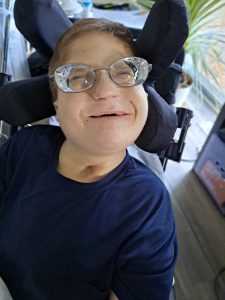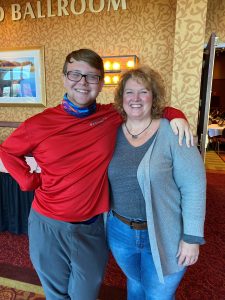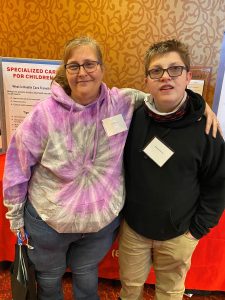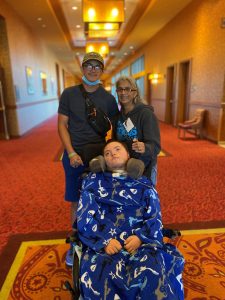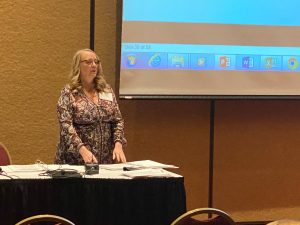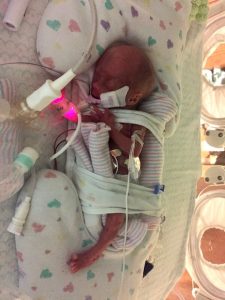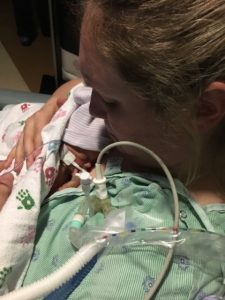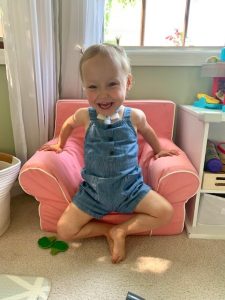Parent Education Workshop Series Open to All DSCC Families
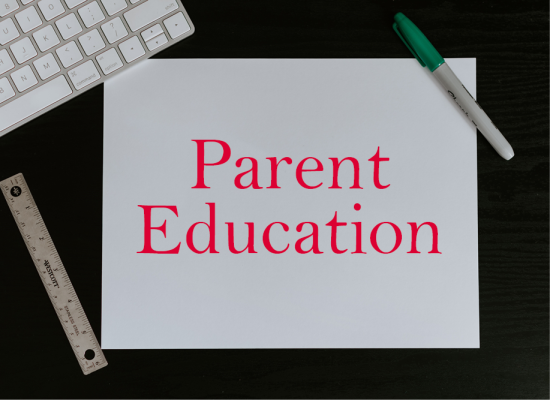
DSCC partners with IL LEND to offer an online space for parents to learn about important topics, gain resources and discuss strategies
A new webinar series provides an online space for parents and caregivers to access educational workshops, learn about resources and discuss strategies and support needs.
The series is open to all parents and caregivers of children enrolled with the University of Illinois Chicago’s Division of Specialized Care for Children (DSCC).
It’s the result of a partnership between DSCC and UIC’s Leadership and Education in Neurodevelopmental and related Disabilities Program (IL LEND).
There is no cost for families to participate.
Please note this workshop series now has a parent education focus rather than a traditional support group.
The virtual workshops will take place via Zoom on the third Wednesday of the month through April.
Workshops topics may include:
- Respite care
- Feeding
- Ventilator maintenance/cleaning
- Transportation
- Navigating relationships with staff
The workshop schedule is for the following dates from 7 to 8 p.m.:
- Feb. 16
- March 16
- April 20
The topic for the Feb.16 session is Early Intervention. The guest speaker is Maria Kastanis, assistant director of the Early Intervention Training Program (EITP) at the University of Illinois at Urbana-Champaign.
The details and registration information for the next meeting are below:
- WHAT: Educational workshop series for parents/caregivers of children and youth enrolled in DSCC’s programs
- WHEN: Feb. 16, 7 to 8 p.m.
- TOPIC: Early Intervention (Note: the discussion part of the workshop will include a facilitator for Spanish-speaking families.)
- WHERE: Virtual via Zoom
- Registration link
Visit the workshop series website for more details about the series and individual meetings.
We’ll also post details about upcoming meetings in the Events section of our website.
If you have questions about the series or an individual meeting, please fill out the Contact Us section of the workshop series website.
Program Coordinator Assistant Earns DSCC’s 2021 Merit Award
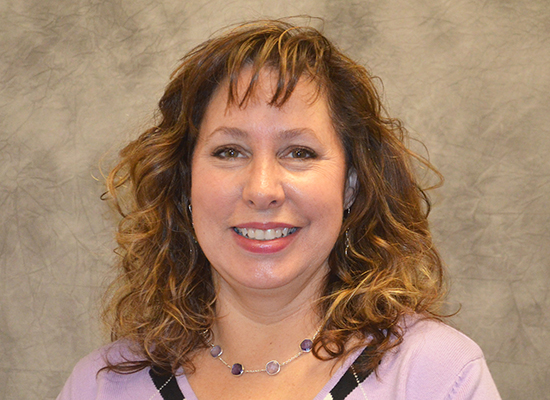
Kimberley Firkins recognized for exemplifying DSCC’s mission to partner, help and connect
Kimberley Firkins is the 2021 recipient of the Award of Merit from the University of Illinois Chicago’s Division of Specialized Care for Children (DSCC).
The award recognizes exceptional employees for outstanding dedication and service to Illinois children with special healthcare needs.
Kimberley, also known as “Kim” or “Kimba“ to co-workers, is a Program Coordinator Assistant for Home Care Region 2. She is based in the Lombard Regional Office.
Program Coordinator Assistants work as a team with Care Coordinators to meet our participant families’ needs.
Kimberley is a team player and a constant source of encouragement and support for her participant families and co-workers alike.
Her colleagues say she is friendly, welcoming and gladly offers her creativity, knowledge and skills to assist wherever needed.
She sends her Lombard teammates positive messages and self-care tips weekly to keep everyone motivated and foster a positive work environment. Those messages have helped bridge the “disconnect” of working remotely through the pandemic.
Co-workers say her calm and caring nature puts the families she works with at ease.
“Kimberley’s enthusiasm and passion for serving others are an inspiration to many,” said DSCC Executive Director Thomas Jerkovitz. “The past two years have been challenging. Kimberley’s teamwork spirit highlights that the way we are working may be different, but our dedication to each other and our participant families remains strong.”
Kimberley has worked at DSCC for 16 years in the Core and Home Care programs.
“I would like to say how fortunate I am to work in an organization that makes such a huge impact to so many people and families, especially over the last almost two years,” Kimberley said.
“I hear from families almost every day how important it is for them to hear from their care coordination team not just as their Care Coordinators or the Care Coordinators’ Assistants but as their friends as well, wanting to know how they’re doing, how things are going, and how they’re handling all of the stressors that are happening right now. It just means so much to me to know that our organization has that place in their family.”
Kimberley was an Award of Merit nominee in 2016, 2018, 2019 and 2020. She said she is both honored and surprised to receive the 2021 award.
“I am so very grateful. It means the world to me, but I don’t do what I do without everyone else. We’re all one team. We all won this,” she said.
DSCC staff nominated a total of six of their colleagues for this year’s Award of Merit. As the winner, Firkins receives an Award of Merit memento, a $2,500 award and recognition from the Executive Director.
The other 2021 nominees are:
- Cynthia Booth, Home Care Program Hospital Liaison, Chicago Home Care Regional Office
- Becca Hunt, Care Coordinator, Marion Regional Office
- Danielle Osburn, Claims Unit Assistant Supervisor, Central Administrative Office
- Tess Rhodes, Quality Improvement Specialist with Core Quality Improvement, Central Administrative Office
- Marian Walles, Care Coordinator, Mokena Regional Office
Congratulations, Kimberley! And a big thank you to all the nominees for their excellence on behalf of our children and families!
Transition Conference Prepares Youth With Disabilities for Adulthood
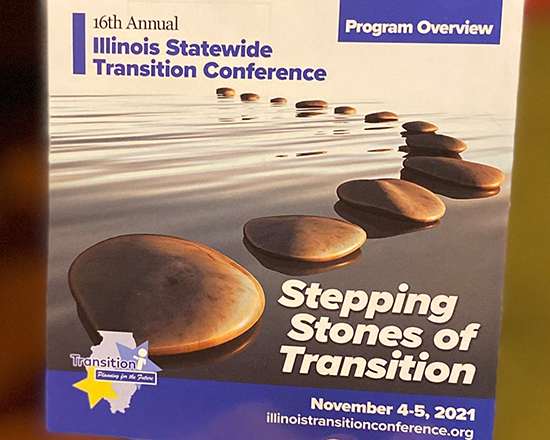
Families and professionals came together in person and virtually at the annual Stepping Stones of Transition Conference in East Peoria to improve outcomes for transition-age youth with special needs
As a single parent raising a child with complex medical needs, Kristen Fisher says it’s easy to feel isolated.
The feeling subsided as she walked through the East Peoria Riverfront Conference Center and saw dozens of other parents and youth with similar needs.
“Seeing everyone at the conference and meeting other parents, it helps confirm that I’m not alone,” Kristen said.
The Illinois Statewide Transition Conference, titled “Stepping Stones of Transition,” returned for its 16th year on Nov. 4-5 in East Peoria after a one-year absence due to the COVID-19 pandemic.
More than 660 families and professionals gathered in-person and virtually to gain skills, resources and information to help youth with disabilities prepare for adulthood.
The University of Illinois Chicago’s Division of Specialized Care for Children (DSCC) is a conference sponsor and served on its steering committee.
DSCC covered the conference-related expenses for 33 of our participant family members across the state.
A “Phenomenal” Experience
Kristen is the mother of DSCC participant Connor Fisher, who will soon turn 15 years old. He was born prematurely with profound delays and a “smile that will melt your heart,” she said.
This year’s conference was Kristen’s first and she called the experience “phenomenal.”
“It’s hard to grasp that my baby is not a baby. He’s growing up. It’s a scary transition,” she said.
Kristen particularly enjoyed the breakout session “SSI, SSDI, HFS: Understanding the Alphabet Soup of Government Benefits.” She gained a better understanding of available government benefits and how they change over the lifetime.
DSCC mom Amy also learned helpful information during the breakout session on government benefits. She said financial planning is an important part of preparing for her daughter Jaida’s future. Jaida, 17, has been a DSCC participant since just after birth.
Eighteen-year-old DSCC participant RJ Smith attended the conference with his mom, Karla. It was the first time attending for both.
RJ is a senior in high school who plays the baritone in his high school band. He wants to go to culinary school after graduation to become a baker.
He picked all the conference breakout sessions that he and Karla attended.
One of their favorites was about the Fast Track Transition Program through the Illinois Department of Human Services’ Division of Rehabilitation Services. The program provides pre-employment transition services to students with disabilities.
RJ said he is ready for more independence, and Karla said the session helped open her eyes to more options to help achieve that.
“I want to help him become more independent and push him toward that but not just leave him sitting the middle of the road, stranded,” Karla said. “(The conference) overall has been helpful.”
Preparing for Life After Graduation
The conference consisted of informative breakout sessions in the areas of:
- Employment
- Education
- Community
- Health Care
DSCC participant Michael Rounds, 15, said he enjoyed the breakout session on the Culture of Coordinated Support Model. This model is where people with disabilities, families, supporters, agencies and service providers work together to develop and implement consistent support plans with unified goals and services provided by the provider best suited to do so.
Michael said the session made him think about getting more involved with his Individualized Education Program (IEP) at school. He also liked learning more about what choices are available to him as he plans for his future.
His mother, Lori, said the conference helped her know where to start in preparing Michael for life after high school graduation.
Rosa Menard, mom to 17-year-old DSCC participant Jacob, said the amount of information to soak up over the two-day conference was almost overwhelming. She took many notes about potential resources and programs to discuss during Jacob’s next IEP meeting.
Jacob is non-verbal and she wants to set him up for success after high school.
Rosa encouraged other families to start the transition planning process as soon as possible.
“Start asking those questions now,” she said.
Improving Outcomes
Nearly 40 DSCC staff members attended the conference in-person or virtually to network, learn from others and strengthen their skillsets and tools to serve our families.
DSCC also sponsored the conference’s health care track for providers who play a role in the transition from the pediatric to adult healthcare system and those who build youth’s capacity and healthcare skills to prepare for adulthood.
DSCC Transition Specialist Darcy Contri said attending providers found helpful tips and information they will apply in their own practices and interactions with youth and families. These changes include:
- Starting the transition planning process sooner with patients and families
- Making sure the youth and their family are included in all decision-making and planning
- Keeping a holistic view of the patient and noting environmental barriers for their family
- Emphasizing self-determination when working with youth and families on transition goals
- Discussion of self-management strategies with youth and families
Darcy has been involved with planning the conference for the last 16 years.
“Every year it has been exciting to see the positive impact the transition conference has on improving outcomes for Illinois transition-age youth and their families,” she said.
Visit our Facebook page to see more photos from this year’s conference.
New Support Group and Workshop Series for Home Care Families
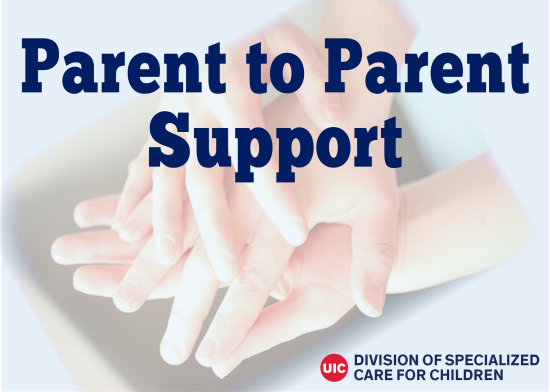
UPDATE: Please note this support group is now open to all families of children enrolled with the Division of Specialized Care for Children. See the latest support group news for more details.
The University of Illinois Chicago’s Division of Specialized Care for Children (DSCC) is partnering with UIC’s Leadership and Education in Neurodevelopmental and related Disabilities Program (IL LEND) to offer a support group for families enrolled in the Home Care Program.
The Home Care Program helps children and adults who require in-home nursing care. DSCC operates the Home Care Program on behalf of the Illinois Department of Healthcare and Family Services.
This support group will provide an online space for parents to access educational workshops and swap concerns, resources and strategies.
There is no cost for families to participate.
The group will meet on the third Wednesday of the month from November through April.
Workshops topics may include:
- Respite care
- Feeding
- Ventilator maintenance/cleaning
- Transportation
- Navigating relationships with Home Care staff
IL LEND would also like to hear families’ ideas for future support groups and workshop topics. You can share your feedback on this brief online form.
The support group schedule is for the following dates from 5:30 to 6:30 p.m.:
- Nov. 17
- Jan. 19
- Feb. 16
- March 16
- April 20
Here are details for the first session:
- WHAT: Virtual support group/workshop series for parents/caregivers of children and adults enrolled in the Home Care Program.
- WHEN: Nov. 17 from 5:30 to 6:30 p.m.
- TOPIC: Navigating the COVID-19 Pandemic (Note, the discussion portion of the support group will include a facilitator for Spanish-speaking families.)
- WHERE: Virtual via Zoom
- REGISTER: Please sign up online in advance. After registering, you will receive a confirmation email containing information about joining the workshop discussion via Zoom.
New Monthly Mama Therapy Group for Central Illinois Caregivers
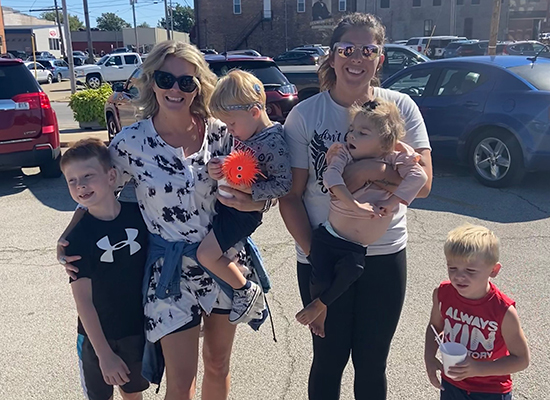
A DSCC mom and her friend started the Facebook group to connect with other parents of children with special needs
Thanks to an outing at a coffee shop, hearing aids and an impromptu conversation, two moms with children of similar ages and needs connected.
“I saw her daughter’s hearing aids. My son has them, too, so I just started talking to her,” Lace Mandrell said of her first meeting with Bailey McBurney Imig.
In no time Lace and Bailey were texting, talking and sharing tips, concerns and road trips to specialists.
Their immediate connection led to a new Facebook group called “Monthly Mama Therapy.”
Monthly Mama Therapy aims to help central Illinois caregivers of children with special needs connect with and support one another.
“If you’re trying to understand a diagnosis or therapy, running from appointment to appointment or saving for the next piece of equipment, things can be challenging,” said Lace “We just thought that having a network of moms with a wide range of experiences, ready to back you up on the good days and the bad days, would be amazing.”
Lace is the mother of two sons, Ollie and Auggie. Auggie, 3, is bilaterally deaf and has had cochlear implant surgery. He also has Chiari Malformation and was diagnosed with Waardenburg Syndrome.
“He’s a wild child who rarely stops moving,” Lace said. “He’s sweet, inquisitive and a little sponge excited about learning and soaking up everything around him.”
Auggie is a participant in the University of Illinois Chicago’s Division of Specialized Care for Children (DSCC). He has been enrolled with DSCC since 2019.
Bailey McBurney Imig is also the mother of two: Paxton, 3, and Parker, 2 1/2. Parker is deaf and has undergone multiple screenings and tests. There is still no diagnosis for her other conditions.
“With all of the testing and so few answers, I feel like she’s probably that one in a million child who will have a diagnosis named after her,” Bailey said. “But, despite all her complications, Parker is a tiny, little bundle of joy who loves attention. She’s an easy-going cuddler who is almost always happy and smiling.”
During their first meeting, Lace and Bailey related to each other right away.
“We just hit it off and I’m so glad. With HIPAA (the Health Insurance Portability and Accountability Act) and concerns for privacy, it can make it hard to connect. Then COVID-19, online therapies and everything else got thrown in,” said Lace. “It’s hard to do this stuff alone. It can get really complicated and overwhelming.”
The more Bailey and Lace talked, the more they wanted other moms in the “same or similar boat” to have a safe space where their kids could connect and they could relax, share and recharge. The seed for Monthly Mama Therapy was planted.
Monthly Mama Therapy has a private Facebook page and hosts meet-ups at local parks, coffee shops and other venues in the Champaign and Bloomington areas. Conversations online and in-person may range from accessible parks and walking trails to experiences with therapies or the transition to school.
The group promotes “therapy” and the importance of caregivers taking care of their own needs, too.
“The online community is really growing. When someone asks a question, the support and responses have been great,” said Bailey. “Our ultimate goal is to build an in-person community that’s just as strong.”
Monthly Mama Therapy hopes to continue growing online and meeting in person when the weather turns cool at central Illinois locations where distancing is possible.
“Our wish list includes adding some veteran parents who are willing the help the ‘newbies’ navigate and prepare for the transitions ahead,” said Lace. “We’d also love to add activities like exercise or yoga to do together.”
For more information, visit the Monthly Mama Therapy Facebook page.
Tell Us About Your Home Nursing Experience
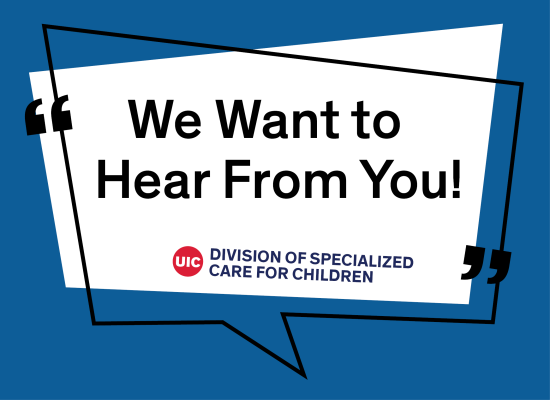
A brief survey for Home Care Program families will help us improve service and support
Attention all families in the Home Care Program! We want to know how well your family’s nursing agency is meeting your needs.
The University of Illinois Chicago’s Division of Specialized Care for Children (DSCC) team has put together a short, 10-question survey for families to complete.
We will not share your individual survey responses with anyone.
There is no requirement to share your name or your child’s/participant’s name. Entering this information is completely optional.
We will group your survey responses with those from other families to better understand how rate increases are affecting nurses working in the home.
Our ultimate goal is to improve the services and support available for DSCC participants with complex medical needs.
Please note this survey is only for families enrolled in the Home Care Program who receive in-home shift nursing services.
You can fill out the survey at https://uic.ca1.qualtrics.com/jfe/form/SV_85Pqs6nSdnHb7ds.
The survey is available in both English and Spanish.
The deadline to complete the survey is Oct. 19.
We appreciate your feedback and partnership!
DSCC Mom Helps Create Nonprofit for NICU Families
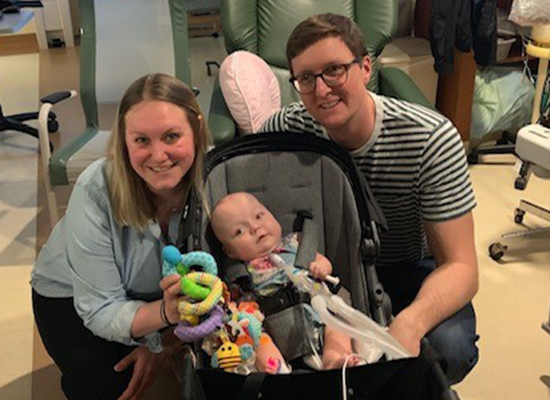
Jessica Wolff teamed up with her therapist friend to create The Nest Postpartum to provide resources for NICU families at Carle Hospital
As the mother of twin daughters born extremely premature, Jessica Wolff is intimately familiar with the stress and heartache of having a baby in the neonatal intensive care unit (NICU).
One of her twin daughters was stillborn. The other, Lily, was born with complex medical needs and spent eight months in the NICU at Carle Hospital in Champaign.
“Often, I was the only parent there (in the NICU) and there were 20 to 30 other babies there,” Jessica recalled. “There are so many barriers that families face while in the NICU, whether it’s transportation to be able to be there for their baby every day or access to meals for the rest of the family. (NICU parents) often have to leave the NICU early to go home for their other kids and make dinner and make sure everyone is fed.”
Jessica, who is a social worker, talked about these experiences with her good friend Paige Raab, who is a pediatric physical therapist. Paige works closely with many NICU families. She also had two traumatic births herself that resulted in NICU stays.
Both women talked about the disparities they saw in the NICU and decided to do something to help. Paige proposed starting a nonprofit foundation, and The Nest Postpartum was born.
“There is definitely a hole we noticed in community services (for NICU families). Paige came to me with the idea, and we built it from the ground-up,” Jessica said.
The Nest Postpartum aims to provide services such as transportation, lodging, prepared meals, care coordinator check-ins and links to other community support programs for families staying in Carle’s NICU.
“We are hoping to provide transportation resources, whether public transportation, gas gift cards or access to rideshare programs and then we’re going to provide families with premade ready-to-cook or ready-to-eat meals. And if the (Carle Auxiliary) Guest House is unable to accommodate a family, we’ll provide hotel stays to bridge that gap,” Jessica said.
The Nest Postpartum also will provide care coordinators who are NICU moms themselves and/or have a healthcare background. These care coordinators will check in weekly with Carle NICU families to connect them with resources or provide emotional support.
Jessica and Paige started fundraising for The Nest Postpartum over the summer. The nonprofit will officially launch on Oct. 4.
“We’ve had amazing, overwhelming community support,” Jessica said. “The NICU staff themselves are super excited and the social workers we’re working with through the hospital are excited to have these resources available.”
The Nest Postpartum will initially only take referrals from Carle social workers. Jessica said interested families in need can reach out to their hospital social worker or tell their bedside nurse.
Jessica said she is thrilled to provide a valuable service to families experiencing similar struggles as her own.
Her daughter, Lily, now 3, came home relying on a ventilator to breathe. She has been enrolled with the University of Illinois Chicago’s Division of Specialized Care for Children (DSCC) since she was an infant. She has received in-home nursing services through the Home Care Program. DSCC operates the Home Care Program on behalf of the Illinois Department of Healthcare and Family Services (HFS).
“We really enjoyed having the support of the Home Care Program. Coordinating the medical benefits and medical supplies and nursing was really a full-time job while keeping her alive was a full-time job for me,” Jessica said. “DSCC has been really important in making sure that Lily is home and successful.”
Jessica said she hopes The Nest Postpartum will provide other NICU parents the connection and camaraderie that’s been so beneficial for her.
“Having the support and the community of other parents who have lived this has been absolutely invaluable. I found myself for eight months only being able to focus on Lily and her survival. Coming home from the NICU was equally overwhelming because of her intense medical needs. We ran an ICU out of our house for over a year until she was able to come off the vent a bit,” Jessica said.
“To find these other mothers who walked the same path has really been life-saving for us.”
To learn more about The Nest Postpartum, visit https://www.thenestpostpartum.org/.
You can also watch local media coverage about the non-profit:
Public Comment for Proposed MFTD Waiver Amendments

Families have until Oct. 2 to provide feedback on several updates to the Home and Community-Based Services Waiver for children who are medically fragile and technology-dependent
The state invites families to provide feedback on several proposed amendments to the Home and Community-Based Services waiver for children who are medically fragile and technology-dependent (MFTD).
The Illinois Department of Healthcare and Family Services (HFS) operates the MFTD waiver. Many families in the Home Care Program have children who receive services through the MFTD waiver.
HFS has announced the following proposed amendments:
- Increase the Placement Maintenance Counseling rate from $50 to $86.28 to be more consistent with the Illinois Department of Human Services’ rates for counseling services.
- Update the cost projections for In-Home Shift Nursing and Certified Nursing Assistant for the waiver’s fifth year to account for recent rate increases and individuals over age 21 continuing to receive waiver services.
- Add Electrical Assessments to the current service definition under “Environmental Accessibility Adaptation” as an available option.
- Add Generators to the current service definition under “Environmental Accessibility Adaptation” as an available option.
- Lower the required number of bids for vehicle modifications from three to two.
HFS now invites the public to comment on these proposed amendments. (You can read the public comment notice on the HFS website.)
To review the full waiver amendments, you can:
- Download and read and/or print a hard copy of the amendments from the HFS website.
- Call (217) 524-4148 to receive a hard copy.
- Review copies at Healthcare and Family Services offices at :
- 201 South Grand Ave. E.,
Springfield, IL 62763
- 401 S. Clinton
Chicago, IL 60607
- 201 South Grand Ave. E.,
The deadline to provide feedback is Oct. 2.
You can submit feedback in two ways:
- Via email at HFS.HCBSWaiver@illinois.gov
- Via mail to the Illinois Department of Healthcare and Family Services, Attention: Waiver Operations Management, 201 South Grand Ave. E., 2FL, Springfield, IL 62763
HFS and the University of Illinois Chicago’s Division of Specialized Care for Children will review the comments and respond to them.
We will then submit comments to the federal Centers for Medicare and Medicaid Services as part of the amendment approval process.
Family Input Guides State Plan for Children With Medical Complexity
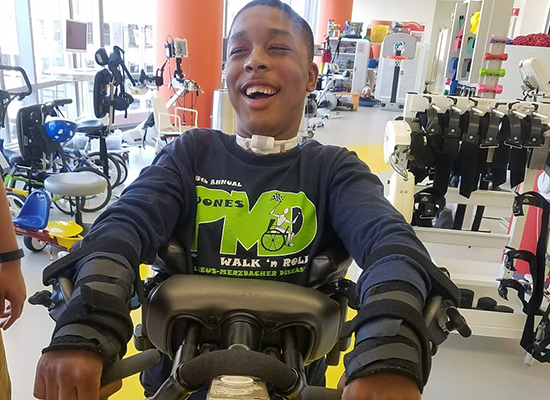
Illinois awaits approval to use FMAP funds for improving care for our Home Care Program participants
Illinois has developed a plan to use increased federal funding to improve support and services for children and youth with complex medical needs.
This plan incorporates valuable feedback from our participants, stakeholders and staff members at the University of Illinois Chicago’s Division of Specialized Care for Children (DSCC).
The extra funds are part of the American Rescue Plan Act of 2021. The act gives Illinois a temporary 10 percent increase in federal funding for home and community-based services (HCBS). This 10 percent increase is called the Federal Medical Assistance Percentage or FMAP.
Illinois must use the FMAP funds to enhance, expand or strengthen HCBS.
HCBS includes the waiver for children who are medically fragile and technology-dependent (MFTD). Therefore, the FMAP can provide extra funds to help support children and youth in the Home Care Program and their caregivers. FMAP improvements will also affect individuals who receive in-home, shift-based nursing as a non-waiver benefit.
In late May, DSCC asked our participant families, staff and community partners for input on how to use the FMAP funds. We also sought feedback on DSCC’s ideas for improving HCBS for Home Care participants.
We shared the input we received with the Illinois Department of Healthcare and Family Services (HFS). We then worked with HFS to develop Illinois’ proposal for using the FMAP funds.
Ideas included in the proposal are:
- Expand consumer direction (the ability for consumers to make choices about the services they receive) to allow unlicensed family caregivers to be paid caregivers. DSCC would then work to develop health and safety monitoring, assist with training and more. This change could provide caregiver relief to a large number of Home Care families.
- Develop a nursing portal where open shifts could be posted by nursing agencies and families. This portal would be visible to home nurses and families. The intent is to try to improve nursing coverage for open shifts across the state.
- Improve training and access to training to help improve the quality of nursing care in the home. This initiative would include developing training that builds on and complements existing training for caregivers in the home.
- Increase the in-home respite nursing rates to match the rates from the 2019 nursing rate increase.
- Increase the child-specific training rates to match the rates from the 2019 nursing rate increase.
HFS submitted Illinois’ proposal to the federal Centers for Medicare and Medicaid Services in July. We are now awaiting its approval and planning for the necessary next steps.
It is important to note that though the FMAP funding increase is temporary, we hope to make many of these changes permanent. We are discussing how to handle any relevant long-term costs with HFS.
We are excited about this opportunity to improve care for our Home Care Program participants.
Thank you to everyone who took the time to share their ideas and feedback with us.
We will continue to share updates on the status of Illinois’ proposal as they become available.
DSCC Care Coordinator Raising Funds for Soldier Suicide Prevention
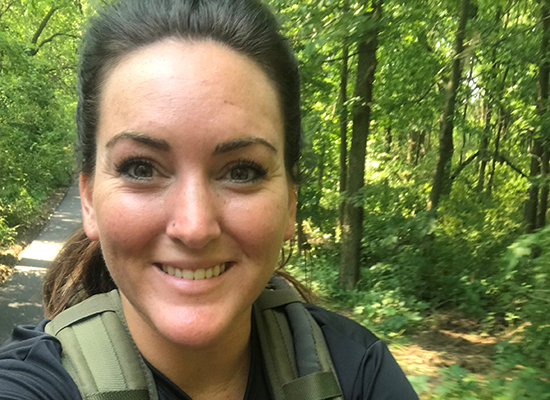
Haley Shropshire of the Peoria Regional Office is biking 250 miles as part of nationwide Stop Soldier Suicide Cycling Challenge in July
Four months ago, Haley Shropshire, a Division of Specialized Care for Children (DSCC) Care Coordinator from the Peoria Regional Office, got a new bike. She hadn’t owned a bike since she was 10. Now, she’s part of the Stop Soldier Suicide Nationwide 250 Mile Cycling Challenge during July.
The challenge is raising awareness and funds to end soldier suicide.
“I’ve grown up surrounded by family members and other individuals who have served in the military. My father served seven years in the Army infantry and although he didn’t die of suicide, it’s important that I show my support and respect for what he did to serve our country,” explained Haley. “I don’t usually do Facebook fundraisers, but I love this cause and just had to go for it!”
According to the Stop Soldier Suicide website, veterans are at a 50 percent higher risk of suicide than their peers who have not served. Stop Soldier Suicide’s mission is to reduce the military suicide rate by 40 percent by 2030.
Funds raised through their Facebook challenges provide direct support to service members and veterans at risk for suicide.
Haley cares deeply about this cause and is hoping others will visit her Facebook page for more information, to check on her progress or make a donation by Aug. 7.
“Riding my bike is just so freeing! I’ve really been encouraged by the great comments and support,” Haley said “I set up my page in June and was surprised when I passed my goal before I started riding. I bumped up my goal and am really hoping I can pass it again. It’s all been so amazing!”
Haley is fast approaching her current fundraising goal of $500 and has logged more than 143 miles.
“I’m riding because I want to help and I want service members who are struggling to know there’s help,” Haley said. “I would be thrilled if my challenge could raise $1,000. That would help so many get the help they need.”
Haley also encourages any interested DSCC staff members to ride or join her on Facebook.
“I may be riding my bike alone, but I’m not going solo. It’s been incredible,” she said.
If you know a struggling service member, veteran or military family member, Stop Soldier Suicide can help. If you’re a veteran or service member in crisis, please call (844) 317-1136.



